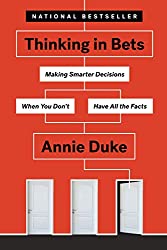
Thinking in Bets by Annie Duke
Intro
I hope this is something that we all contemplate and are seeking ways to find it. Well, your journey has ended and the answer you seek is here. Well, not quite. This is just one source that can hopefully give you new perspective and additional insight.
But if you are a poker player, then this is the place for you. As it seems, you may have the best thought and decision process. Thinking in Bets by Annie Duke is one of those books that can help retrain your thought outcomes.
The book gets right in to the action by illustrating her view by discussing Super Bowl XLIX. If you do not remember how it ended, then may be these phrases will remind you: “What was Pete Carroll thinking?” “Should have gave the ball to Marshawn Lynch.” Yes, the infamous Russell Wilson interception at the goal line that sealed the New England Patriots victory.
The author breaks down Pete’s thought process and elaborates the difference between a good decision that leads to a bad outcome and a bad decision that leads to a good outcome and how they should not be confused. Remember, if Pete’s decision lead to a good outcome and they won the game, all the headlines would have said how brilliant his decision was and how no one saw it coming. It is still the same decision process, but now the narrative changes with a different outcome.
In addition, people tend to take credit for good outcomes and blame others for bad outcomes. People must be aware of this habit as this will lead to bad decision processes. This is called resulting by poker players. See, this book is for poker players. It is also a term that investors have started using frequently in how investing decisions are made.
How to make proper decision process
The author elaborates how our brains are hardwired in our decision making process and it can be an impediment in truth-seeking. Our natural tendency is to hear the truth and not seek validity. To counteract this tendency, the author advises to place a bet on any statement. If people were to bet, then they would confirm their validity. With something on the line, it would motivate people to be objectively accurate. People would less likely make absolute statements and actually do some fact checking.
As we improve our decision making process, how do we learn from our outcomes when it does not go as expected? Most outcomes are mix of skill (your decision process), luck (timing, situational) and unknown information (future trends or poker player’s hands). She emphasizes that if a bad outcome results from a good decision process, one should not blame the decision process for it. One must learn where in the process it may have resulted in the outcome and learn from it. Remember, most of the decision you make in life will be with incomplete information. This is important because you can not let a bad outcome prevent you from using a good decision process in the future. It is especially true if you decide to change a good process in your pursuit of good outcomes.
The author goes in to details on other ways in handling many of the bias that are hard wired in our brains. One is to be part of a group for feedback and outside perspective, but cautions you need to be in right group. The best way is to give each other CUDOS.
Please check this wiki link website for more details on CUDOS – https://en.wikipedia.org/wiki/Mertonian_norms
Takeaways
The book gives fresh perspective and insight so please do check it out. If we make informed decisions and learn from bad outcomes from it, I think we are taking the proper steps in improving ourselves and people close to us.
At the moment, I am reading Principles from Ray Dalio which also discuss making decision process using principles. I do see familiar themes in both where you must learn from the outcome as a feedback loop. You can hone your decision process better from failed outcomes because they can bridge the gap from the incomplete information that may have resulted in the bad outcome.
I will continue to post books that I have read but it is interesting to note many that I have read about self-improvement thought process uses poker players to support their case. It is an interesting trend or I am subconsciously reading these types of books. I will be discussing this interesting trend as well to see if you agree.
Stay tuned!
Annie’s book on Amazon
Thinking in Bets: Making Smarter Decisions When You Don’t Have All the Facts
Her TED talk:

